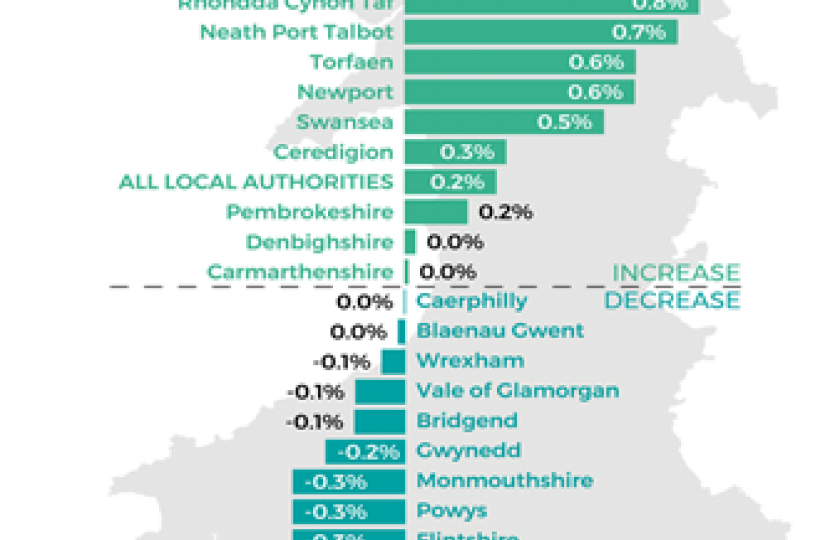
Why does our council tax go up every year, and the services from our local council reduce?
I will answer that question of why we ‘pay more for less’ in this article and touch on related issues.
Powys County Council, and our County Councillors have to set a balanced budget each year. Local authorities are required by law to have a balanced budget which is a financial plan based on sound assumptions which shows how income will equal spend over the short and medium term.
The Council's annual net budget is around £250 million. This is made up of a block grant from the Welsh Government which accounts for about 70% of this total, with the remaining coming from council tax so it ought to be remembered that only around a third of local government funding is obtained through the collection of council tax. The rest is funded by Welsh government.
For the past 10 years, Powys has had a raw deal. It has had the poorest or joint poorest budget settlement in nine of the last ten years and between 2010 and 2020, Powys would have taken £100 million out of their budget - an unsustainable situation which has inevitably affected the delivery of essential local services.
Funding for Welsh councils is overly complex and, in my view, is fundamentally unfair for rural councils. While some councils such as Rhondda Cynon Taf have been able to stockpile £152 million in usable reserves under successive, more generous local government settlements, others such as Powys have to balance the books after years of severe cuts to their budgets.
Powys County Council is not just under pressure from challenging financial settlements, but also from pay awards, an increase in employers’ contributions to teachers’ pensions and increases in the national living wage for externally commissioned services. In my view, these pressures have not been adequately reflected in the funding formula which is used to assess local government funding. Neither does the formula adequately reflect the fact that Powys has a relatively small, disproportionately elderly population which is dispersed across a wide area, placing pressure on the delivery of essential local government services.
This year, Powys has received a cut in its funding whereas local authorities in South Wales such as Cardiff and Rhondda Cynon Taf have had increases in their funding in spite of holding significant reserves.
This very challenging settlement means that Powys County Council is forecasting that it will still have to plug a large gap in funding over the next three years.
This means that councils have significant pressure on them, and with this cut, Powys has little alternative than to set higher councils tax increases, and reduce services.
This isn’t to say that Powys County Council can’t make efficiencies. They have done, and they have streamlined services, consolidated the buildings they occupy and reduced staffing numbers significantly. Can they do more, yes, I think they can, but the efficiencies which all councils have made by reducing senior staff, cutting back office functions and improving processes through automation will just not be enough to shield council tax payers from increases in council tax while having to see cuts to services which they value dearly.
I can appreciate the frustration of council tax payers who will, as the Welsh Local Government Association have rightly said, end up "paying more for less" but it is clear that the difficult decisions which Powys County Council has had to make, are a direct result of the challenging financial settlement from the Welsh Government which is heaping pressure on Powys County Council, year after year. Indeed, Powys are not alone. The Labour-Plaid-Lib Dem-run Pembrokeshire County Council has proposed a 10% increase in council tax for 2019 so they are in the same boat.
Funding for the Welsh Government has never been higher and announcements in the UK Budget provided an extra £550 million for the Welsh Government to spend for the coming financial year. With a rising budget, the Welsh Government could have taken the opportunity to invest in the local government block grant.
However, it chose not to and the Welsh Government's Minister for Local Government seems determined to ignore the growing chorus of local authority voices who are concerned about the unfairness of the funding formula. Just a couple of weeks ago, the Leader and Cabinet of Powys County Council called on the First Minister to change the way County Councils are funded and give rural areas such as Powys a fair deal. In an open letter to Mark Drakeford, the Leader said that Powys and other rural authorities have suffered under-funding for many years as a result of the funding formula and their residents have had to pay the price with council tax increases and reduced services.
The Welsh Government has received increased funding from the UK Government but Powys County Council has had a decrease in its funding from the Welsh Government. Therefore, the principal responsibility for the difficult financial situation which Powys County Council finds itself in must firmly sit with the Welsh Labour Government.
